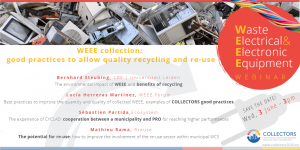
After having explored the economic aspects of paper and packaging waste collection and sorting, COLLECTORS turned its attention to Waste Electrical and Electronic Equipment.
Around 10 million tonnes of WEEE is produced every year in the EU. A meagre 35% of electrical and electronic equipment wound up in official collection and recycling systems. The other discarded electronics are either recycled under non-compliant conditions, illegally traded, exported, or simply thrown in residual waste bins. WEEE contains many high-value and critical raw materials.
During this webinar, experts highlighted the importance of improving the quantity and quality of collected WEEE to ensure its proper recycling from different perspectives, with an emphasis on the potential for reuse, and how to include the re-use organisation in the design of WEEE.
- The environmental impact of WEEE and benefits of recycling | Bernhard Steubing, LDE Universiteit Leiden
Bernhard Steubing, tenure-track assistant professor at the University of Leiden, a COLLECTORS project partner, opened the webinar with a presentation on the environmental impact of WEEE and benefits of recycling. He shared insights from his environmental analysis for small WEEE collection in Pembrokeshire (UK), Helsinki (FI), Genoa (IT), Cyclad (FR), and Vienna (AT), evaluating both their environmental assessment throughout Material Flow Analysis (MFA) and the quantification of their environmental impacts using Life Cycle Assessment (LCA).
His presentation can be viewed here.
- Best practices to improve the quantity and quality of collected WEEE, examples of COLLECTORS good practices | Lucía Herreras Martínez, WEEE Forum
Lucía Herreras Martínez, Deputy Director General of the organisation “WEEE Forum”, another COLLECTOR’s partner, addressed the substantial “knowledge-GAP” that is still calling for actions along the monitoring and enforcement chain of the WEEE flows in EU.
Her presentation about best practices to improve the quantity and quality of collected WEEE can be viewed here.
- The experience of CYCLAD: cooperation between a municipality and PRO for reaching higher performances | Sébastien Partida, Ecosystem
Sébastien Partida, deputy director for waste collection at Ecosystem, one of the French extended producers responsibility organisations in charge of the management of WEEE, told us the experience of CYCLAD: a story of cooperation between a municipality and PRO for reaching higher performances in WEEE collection.
His presentation is available for download here.
- The potential for re-use: how to improve the involvement of the re-use sector within municipal WCS | Mathieu Rama, Rreuse
Mathieu Rama, Senior Policy Officer representing RREUSE, the network of European social enterprises active in re-use repair and recycling, spoke about the potential for re-use, sharing with us how to improve the involvement of the re-use sector within municipal WCS. He discussed how the importance of making repair & re-use easier and cheaper and introduced us the WEEELove campaign and the LIFE RE-WEEE Project.
His presentation can be accessed here.
Watch the full recording of the webinar here.